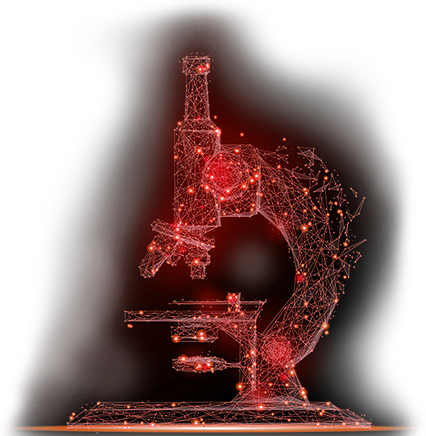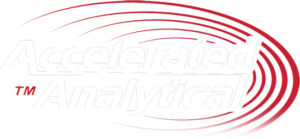COMMON CHEMISTRY TESTS
we offer at Accelerated Analytical Labs.

Accelerated operates a full-service cGMP Analytical Chemistry Lab that provides chemical and elemental analyses for pharmaceutical, API, OTC, cosmetics, and personal care companies.
Testing may be performed according to the following, please contact us to discuss testing options:
- United States Pharmacopeia (USP)
- Food Chemicals Codex (FCC)
- Association of Official Analytical Chemists Official Methods of Analysis (AOAC OMA)
- American Society for Testing and Materials (ASTM)
Click on a test name to expand and learn more.
- Liquid Chromatography
- Diode Array
- Refractive Index
- Gas Chromatography
- Flame Ionization
- Mass Spec.
- LC-Mass Spec.
- ICP-Mass Spec.
- ICP-Optical Emission Spec.
- Total Organic Carbon
- Polarimetry
- Viscometer
- Elemental analysis is an evaluation of the levels of elemental impurities in a test article; this can be qualitative (determining the specific elements present), quantitative (determining the amount of elements present), or semiquantitative (determining the amount within a particular range) depending on testing needs.
- Elemental analysis can be performed by the following instrumentation, as well as by various general chemistry techniques.
- ICP-MS, Inductively coupled plasma mass spectrometry, is mainly used for samples with low levels of total dissolved solids, and is useful in analyzing samples with low regulatory limits.
- ICP-OES, Inductively coupled plasma optical emission spectrometry, is used for samples such as ground water, wastewater, soil and solid waste. In general, ICP-OES is used to measure contaminants for environmental safety assessment and elements with higher regulatory limits.
Purity and Content Analysis test methods can vary significantly depending on the test articles being analyzed as well as the instrumentation used. This type of testing can be either qualitative or quantitative and may be used to confirm the presence or concentration of a specific analyte within a test article. See below for a non-exhaustive list of instrumentation available at Accelerated Analytical Labs and contact us to discuss your specific testing needs.
- Gas Chromatography (GC) – GC-FID, GC-HS, GC-MS, HS/GC-MS
- High-Performance Liquid Chromatography (HPLC) – HPLC-MS, UPLC, DAD, RI
- Ion Chromatography – IC
- FTIR
Method Validations are performed to ensure the ability of the test method to analyze the specified analyte(s) in the presence of the product. This is a crucial step in the testing of any product as it guarantees that the results of the method used are accurate and can be trusted. Without performing a method suitability or validation, uncertainty remains in any results that are reported.
- Full method validations per USP <1225> include the validation of a methods accuracy, precision, specificity, detection limit, linearity and range, robustness, and quantitation limit as applicable.
- Method validations available in accordance with 21 CRF Part 211 165E and ICH Q2
- Method verifications of compendial methods per USP <1226> are also available upon request.
USP Testing
- The United States Pharmacopeia – National Formulary (USP-NF) includes quality standards for medicines, active pharmaceutical ingredients (APIs) and excipients (inactive ingredients). These standards are used to help ensure the quality of medicines and their ingredients, and to protect the safety of patients everywhere. Testing per USP requirements allows our Clients to demonstrate regulatory compliance for their products and/or devices. USP Testing may be performed by general chapters as well as partial or full monographs depending on your testing needs.
- Per USP, Monographs set the quality expectations for a specific article including for its identity, strength, purity, and performance. General Chapters, on the other hand, may be applicable to multiple articles.
- Common General Chapter analyses
- <191> Identification Tests – General
- <197> Spectroscopic Identification Tests
- <221> Chloride and Sulfate
- <228> Ethylene Oxide and Dioxane
- <231> Heavy Metals
- <232> Elemental Impurities – Limits
- <281> Residue on Ignition
- <401> Fats and Fixed Oils
- <467> Residual Solvents
- <541> Titrimetry
- <611> Alcohol Determination
- <621> Chromatography
- <643> Total Organic Carbon
- <645> Water Conductivity
- <731> Loss on Drying
- <781> Optical Rotation
- <791> pH
- <831> Refractive Index
- <841> Specific Gravity
- <921> Water Determination
Please contact us for Monograph testing to ensure capability to run analyses requested.
The Food Chemical Codex (FCC) is an internationally recognized compendium of standards that are used to verify the identity, quality, and purity of food ingredients. FCC Monographs include food-grade chemicals, processing aids, food ingredients, flavoring agents, vitamins, and functional food ingredients.
Our analysts are skilled in a wide range of both qualitative and quantitative techniques such as colorimetry, gravimetry, and titrimetry. Our facility houses an expansive collection of analytical equipment such as Autotitrators, Ultraviolet-Visible Spectroscopy (UV-VIS), Fourier-Transform Infrared Spectroscopy (FTIR), Densimeters.
